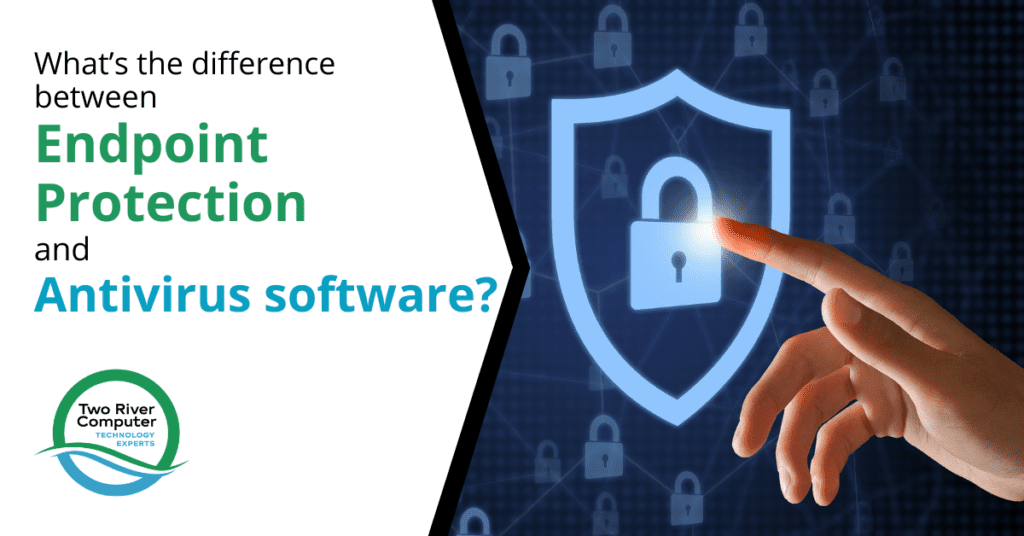
When you’re looking at different types of cybersecurity protection for your Fair Haven business, it’s easy to get confused between antivirus and endpoint protection.
One is something that everyone is pretty familiar with. We know that antivirus is used to detect and keep devices safe from viruses, spyware, adware ransomware, and other types of malware. But if you already have antivirus, should you consider switching to endpoint protection instead? Is it better?
If you have a business network with more than a single computer, then the answer is, “Yes.” Endpoint protection is not the same as an antivirus. It can do everything that an antivirus can do, plus a whole lot more.
Between the first and second quarters of 2021, data breaches rose by 38%.
You can think of endpoint protection as an advanced threat safeguard for your entire network and all the endpoints that are attached (computers, servers, mobile devices, etc.). It’s designed to go beyond simple detection of malware, like viruses and ransomware.
Endpoint protection applications are powered by AI and machine learning and are proactive. The app is continuously searching for behavioral anomalies to detect even the most advanced threats to your network. Threats that most antivirus programs aren’t built to defend against.
There are several other differences beyond that, which we’ll get into next.
Antivirus vs Endpoint Protection
Monitoring and Detection
Antivirus will monitor the device it’s installed on and look for any malware threats. It will typically scan your system at scheduled times.
An endpoint protection application will scan your entire network for any threats and look for any reported issues or anomalous behaviors throughout the network. It will discover any new endpoints and detect potential vulnerabilities.
Threat Identification
Threat identification for antivirus is localized just to the device that it is installed on. Many antivirus applications are signature-based which makes them less effective at detecting threats considered “zero-day.” Zero-day threats are not yet in a threat signature database, thus programs using signature-based detection can’t identify them.
With an endpoint protection program, threats are detected throughout the network and can be blocked through a firewall. Endpoint protection often includes a next-gen firewall that can deploy advanced protection like zero-trust security (e.g., application safe-listing) and data loss protection (DLP). It’s designed to catch zero-day threats through advanced AI.
Automated Threat Response
Antivirus software will typically give you an alert and tell you a virus or other type of malware has been found. However, it’s up to the user to take it from there and decide what to do next.
Endpoint protection software offers automated threat responses that can detect threats and also remove them per your pre-programmed security policies. This provides a more robust method of defense and allows threats to be neutralized immediately without the need for human intervention.
Integrations
Antivirus is generally a standalone product. It doesn’t really integrate with any other programs. It’s not designed to connect to things like Active Directory, for example.
On the other hand, endpoint protection applications are made to fit into your larger technology infrastructure. You’ll find that they integrate with components like Active Directory, network monitoring, and a security information and event management (SIEM) system, which is a tool that logs all system events.
Data Loss Prevention
Antivirus is only designed to focus on detecting and protecting against different types of malware threats. If there is no malware present in a file, then it doesn’t provide any other protection for that data.
Endpoint protection includes safeguards to mitigate data loss. It can monitor how data is being sent through the network, block suspicious traffic, notify your admin of anomalous patterns, and apply security policies like encryption to certain types of data.
Reporting Across All Devices
Even if your antivirus program provides threat reporting, it’s only going to report on that single device and any potential malware that may have been detected there. You will have to look at a separate report for each device.
Because endpoint protection is looking at all endpoints, reporting is more holistic. You’ll be able to see events and potential threats that are cataloged throughout your network, which can help you identify specific endpoint vulnerabilities that may be impacting certain types of devices.
In summary, if you want to have a secure company network that can defend against multiple types of threats, then you need to have an endpoint protection application, and uninstall any antivirus program.
Find Out What You Need to Properly Secure Your Network
Two River Computer can help your Fair Haven business review the best and most affordable options for endpoint protection. Our goal is to help you sleep more soundly at night because you’re not worrying about a cyberattack.
Contact us today for a free consultation. Call 732-747-0020 or reach us online.


